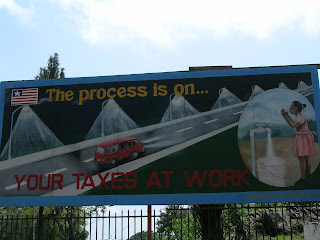I would subconsciously check restaurant taps to see if there was running water before putting soap onto my hands, and at home, I would plug in all chargeable electronic devices before I went to bed in preparation for the eventuality that the electricity supply would cut out in the morning. Of course, the London water and electricity supply turned out to be as reliable as ever. However, all this made me realize how much I had taken for granted before my trip to Liberia.
Another habit I have managed to pick up is the Liberian handshake. The Liberian handshake is your usual Western handshake combined with a little click of the fingers as you let go of the other person’s hand. It was only when I saw the look of amusement my London friends gave me that I realized I was still doing things the Liberian way.
These little habits reminded me both of the things I missed and the things I did not miss about Liberia. I definitely did not miss the lack of running water and electricity, the mosquitoes, the mouse sharing my bedroom, the potholes in the roads and the chaos in the streets of Monrovia. However, I did miss the lush forests, the dramatic rainstorms, and most of all, the wonderful people I have met during my stay there. The determination, strength and humility of President Ellen Johnson Sirleaf and her Iron Ladies will remain a lasting inspiration for me. My colleagues at the Ministry of Finance have shown much kindness and patience towards me, and I shall miss them and that little click of fingers when they greet me and each other in the mornings. Last but not least, I shall miss the ordinary Liberians we have gotten to know, who despite their hardships, did whatever they could to make us feel welcome and at home in their country.
Left: Colleagues from the Ministry
Right: Dolo, our friend and taxi driver

















